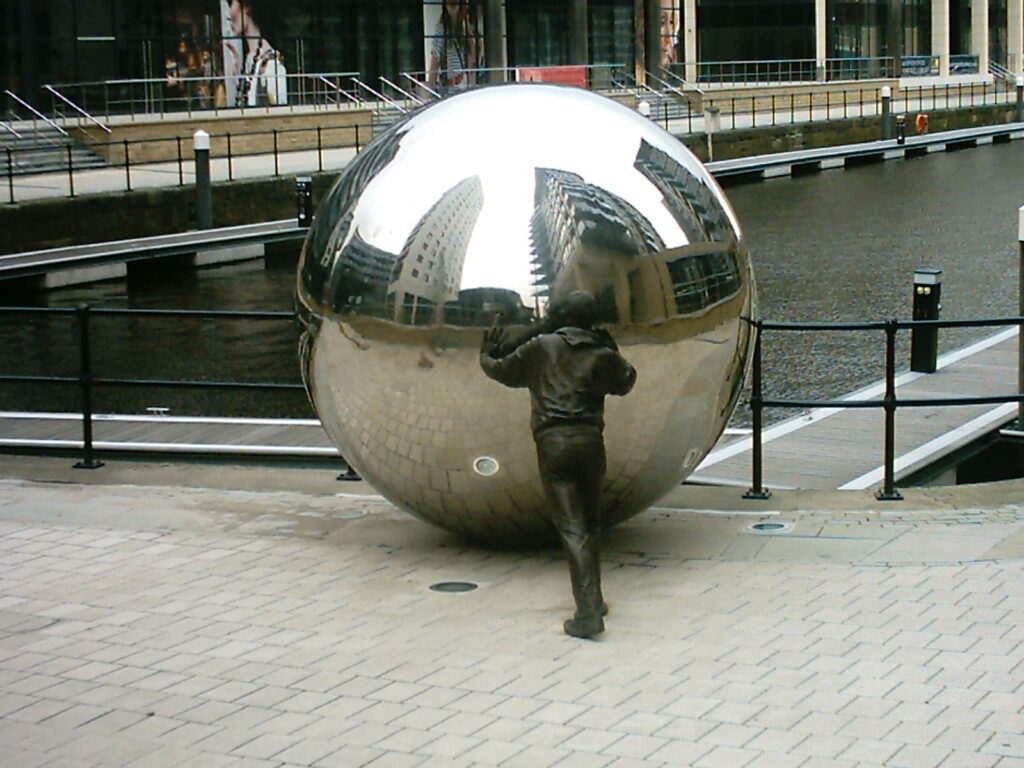
Sculpture, Clarence Dock Leeds, credit Wikipedia
Wharf Factor
By Bill Hartley, back on the waterfront
For those of a certain age, the term ‘worker’s cooperative’ summons up memories of Upper Clyde Shipbuilders, where the late Tony Benn attempted to resuscitate failing industries. Such organisations also exist at a more modest level. Close to the Leeds riverfront, amongst the warehouse conversions, restaurants and offices, lies Wharf Chambers. An undistinguished piece of Victorian architecture, its original business was probably connected to the wool trade. Now it is a worker’s cooperative; though the term is far removed from Scottish shipbuilders or Midlands motorcycle makers. Working class it isn’t. The aim of the co-operative is to provide space for music, art, film and politics. Upcoming events include an evening with Lavender Gray and My Nose is Pierced.
Most of the activity at Wharf Chambers takes place in an unprepossessing ground floor bar that resembles a 1970s student’s union. Presumably, it is here that the cooperative makes most of its money. However, the simple act of selling beer is fraught with complications as their website explains. There are two overarching concerns reflected in their policy documents. First, they are trying to become a ‘safe space’. Ask the average pub patron for a definition of safe space and the answer will be based on how effectively the security staff sort out trouble. It’s highly unlikely though that people whose idea of fun is creating an unsafe space would be seen dead in Wharf Chambers. On the website that old cliché ‘zero tolerance’ is brought out in support of this. Here it is described as any form of ‘oppressive, marginalising or aggressive behaviour’. The vagueness of this definition makes it inhibiting; as its evidently all too easy to breach the etiquette. Dig deeper and it gets more complicated. ‘Barriers’, so the website tells us, ‘may also be interpersonal and we try to be friendly towards our guests’. It’s extraordinary how a statement about basic good manners and courtesy can be so distorted by this tautology. The indications are that this was a committee effort. Incidentally, the toilets at Wharf Chambers are gender neutral so here they may be testing good manners to the limit.
Moving on to concern number two: there is clearly the need for ceaseless vigilance at Wharf Chambers. According to the website, back in 2016 ‘members and users had flagged up an incident relating to racism’. Even after all these years the sense of shame is palpable, as is the self-abasement. They confess their shortcomings, ‘due to our lack of focus on anti-racism work….’ Perhaps not the obvious priority when busy selling beer but at Wharf Chambers, one can’t be too careful. Things appear to be back on track now but of course there is always the risk of complacency. It’s reassuring to know that Chairman Mao is there to guide them;
If we have shortcomings we are not afraid to have them pointed out and criticised because we serve the people. Anyone, no matter who, may point out our shortcomings. If he is right, we will correct them.
Serve the People: Selected Works Vol. III p 227
Subsequent to this incident external help was sought and training provided. As Mao himself would doubtless have agreed, it is an ongoing process. Subjects covered included ‘what are micro aggressions?’ and ‘what is the pyramid of white supremacy?’ Apparently this provided an opportunity to reflect and learn. Selling beer is more complicated that you might suppose. There is a sense of ever decreasing circles. Wharf Chambers conducts surveys and one of the problems identified was that of ‘reporting incidents of racism to a mostly white group.’ The implication here is that only white people can be racist. Actually, if a recent Saturday evening visit was anything to go by, racists would have their work cut out, since only one member of an ethnic minority was present.
Using the right terminology can be a challenge. Throughout the policy documents Wharf Chambers uses the acronym POC which stands for People of Colour. They may have to be careful. One critic memorably reacted to this term by saying, ‘I’m a person, not a crayon’. Elsewhere it has been condemned as a means of ‘taming identity’ or ‘making them more palatable’. It is also seen by some as a lazy way of addressing people. Other critics go further, pointing out that such terms lack humanity. Wharf Chambers might need to rewrite those policy documents. Fortunately they take criticism very seriously. For example, in a member survey on the safe space issue, some wag commented that Wharf Chambers wasn’t a safe space for ‘Tories and right wingers’. This was dutifully reported.
Suppose though that the worst does happen. Help is at hand since there is a ‘Disclosure Flowchart’ activated ‘when a disclosure related to abuse is received’. Wharf Chambers concedes that it is not comprehensive, despite the fact that it runs to thirteen headings. Whether it complies with due process is uncertain. Despite this and other defences, Wharf Chambers accepts that racism can sneak in anywhere. Members of staff are therefore required to ‘reflect and share what anti-racism learning activism they have been engaging’. This goes along with a question asking how each staff member is continuing to educate themselves. The only thing missing is a political commissar to coordinate this activity.
Wharf Chambers has succeeded all too well in creating a safe space, circumscribed by its rules and policies. Saturday evening in the bar, usually the busiest time of the week in Leeds, has a subdued atmosphere. This contrasts with the vibrancy of other bars and clubs in close proximity, which get by with fewer policy documents.
William Hartley is a former Deputy Governor in HM Prison Service










